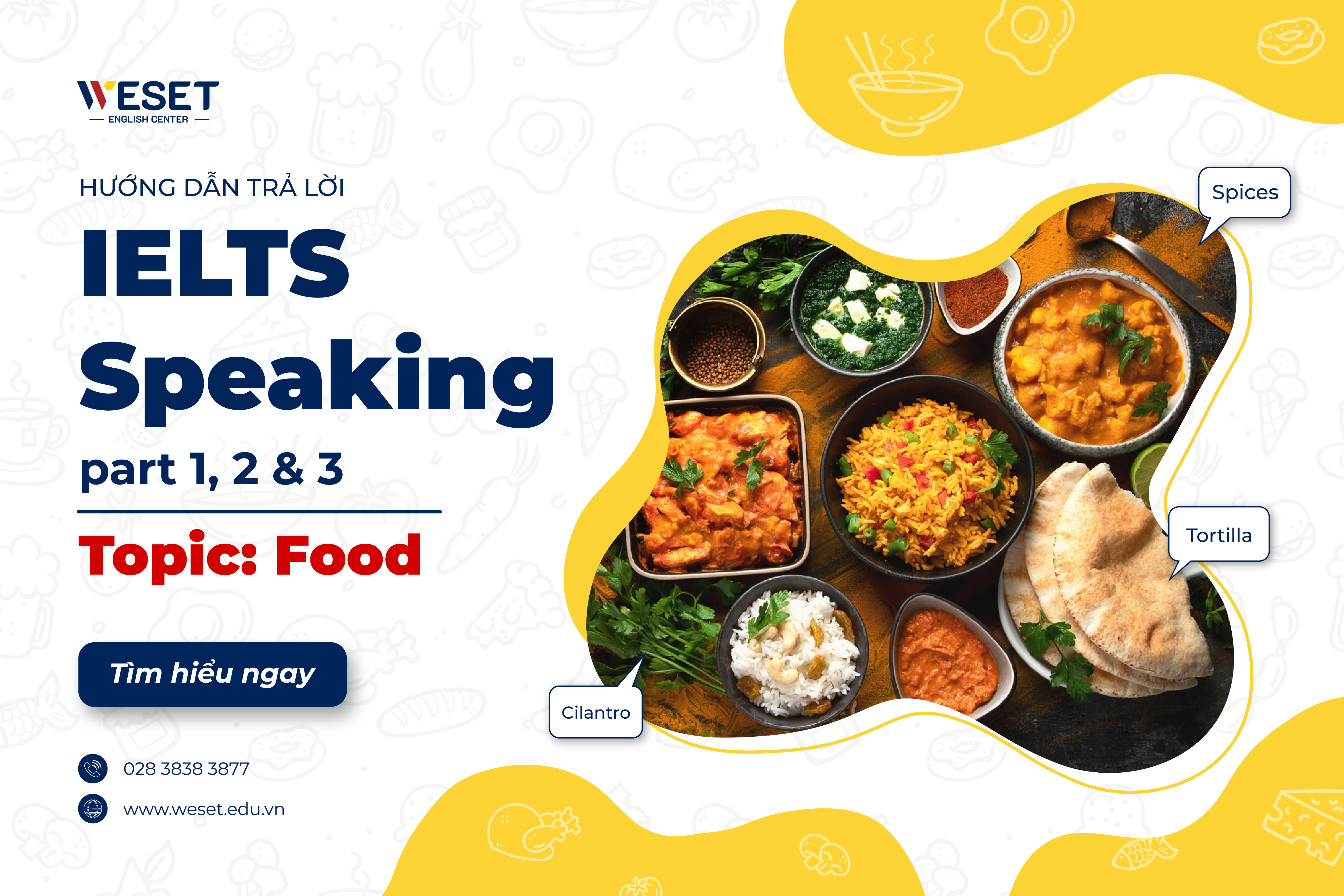Trang chủ Blog Bài thi IELTS mẫu IELTS Speaking Food – Part 1, 2 & 3 Sample & Answer
IELTS Speaking Food – Part 1, 2 & 3 Sample & Answer
- Jonathan M. Pham
- Bài mẫu IELTS Sample Speaking, Bài thi IELTS mẫu
MỤC LỤC
Đến với series bài mẫu hôm nay, bạn đọc hãy cùng WESET khám phá chủ đề IELTS Speaking Food – một topic khá thú vị thường được hỏi trong bài thi nói IELTS bạn nhé!

IELTS Speaking Food – Part 1
Q: Do you enjoy cooking? Why or why not?
A: Yes, I absolutely enjoy cooking. It allows me to be creative and experiment with different flavors and ingredients. I find it very therapeutic and rewarding to prepare a delicious meal from scratch.
Q: What is your favorite type of cuisine? Why?
A: My favorite type of cuisine is Italian. I love the rich flavors, the variety of pasta dishes, and the generous use of fresh herbs and spices. Italian food has a comforting and homely feel to it, which always makes me feel satisfied and content.
Q: Are there any traditional dishes in your country that you particularly like?
A: Yes, in my country, we have a traditional dish called “Biryani,” which is a flavorful rice dish cooked with a variety of spices and meat or vegetables. I absolutely love the aromatic flavors and the way all the ingredients come together to create a delightful meal.
Q: What is your opinion about fast food?
A: Personally, I believe that fast food should be consumed in moderation. While it may be convenient and tasty, it often lacks nutritional value and can be detrimental to one’s health if consumed excessively. It’s important to make healthier food choices and opt for home-cooked meals whenever possible.
Q: Do you prefer eating out at restaurants or cooking at home? Why?
A: I enjoy both eating out at restaurants and cooking at home, but if I had to choose one, I would lean towards cooking at home. It allows me to control the ingredients and cooking methods, ensuring that the meal is healthy and suited to my taste preferences. Additionally, cooking at home is a great way to bond with family and friends.
IELTS Speaking Food – Part 2
Q: Describe a memorable meal you have had. You should say:
- Where and when you had it
- Who you were with
- What you ate, and
- Why it was memorable
A: One of the most memorable meals I have ever had was during a family vacation to Paris, France, a couple of years ago. We decided to try out a highly recommended French restaurant called “La Petite Cuisine” located in the heart of the city.
I was accompanied by my parents and my younger sister, and we were all excited to indulge in authentic French cuisine. The restaurant had a cozy and intimate ambiance, with soft lighting and classical music playing in the background, setting the perfect mood for an exquisite dining experience.
We started the meal with a classic French onion soup, which had a rich and comforting flavor. The caramelized onions and melted cheese on top created a perfect harmony of tastes. For the main course, I opted for a traditional Coq au Vin, which is a chicken dish cooked in red wine with mushrooms and onions. The tender chicken and the robust red wine sauce were absolutely divine. My family members had equally scrumptious dishes, including Beef Bourguignon and Ratatouille.
What made this meal truly unforgettable was not just the delectable food, but also the wonderful company. We shared laughter, stories, and created beautiful memories while savoring each bite. It was a moment of pure joy and togetherness.
Furthermore, the impeccable service provided by the restaurant staff added to the overall experience. The waiters were attentive, knowledgeable, and passionate about the food they served, which made us feel valued and enhanced the enjoyment of the meal.
This meal stands out in my memory because it was a perfect blend of exceptional food, a charming atmosphere, and cherished moments with my loved ones. It truly encapsulated the essence of French cuisine and hospitality, leaving an indelible mark on my taste buds and my heart.
IELTS Speaking Food – Part 3
Q: How has food culture changed in recent years?
A: Food culture has undergone significant changes in recent years. With globalization, people have become more exposed to different cuisines from around the world. This has led to a greater appreciation for diverse flavors and ingredients. Additionally, there has been a shift towards healthier eating habits, with a greater emphasis on organic and locally sourced foods. Furthermore, the rise of social media has played a role in popularizing food trends and creating a culture of food sharing and exploration.
Q: What impact does globalization have on traditional food?
A: Globalization has both positive and negative impacts on traditional food. On the positive side, it allows for the sharing and exchange of culinary traditions, leading to the preservation and promotion of traditional foods. Traditional dishes can gain popularity and recognition on a global scale, attracting tourists and contributing to cultural diversity. However, there is also a risk of cultural appropriation and dilution of authentic flavors as traditional recipes are adapted to suit different palates and commercial demands.
Q: How important is it to maintain traditional cooking methods and recipes?
A: It is crucial to maintain traditional cooking methods and recipes as they are an integral part of a country’s cultural heritage. They carry the history, values, and identity of a community or region. By preserving these techniques and recipes, we ensure that future generations can appreciate and understand their cultural roots. Moreover, traditional cooking methods often emphasize natural and sustainable practices, which align with the growing concern for environmental conservation and health-conscious eating.
Q: What are the advantages and disadvantages of eating out at restaurants?
A: Eating out at restaurants offers several advantages. Firstly, it provides an opportunity to try new cuisines and dishes that one may not be able to cook at home. It offers convenience, as there is no need to prepare or clean up after a meal. Additionally, dining out can be a social experience, allowing people to gather, celebrate, and enjoy a shared meal. However, a disadvantage of eating out is the potential lack of control over the ingredients and cooking methods used. It can also be more expensive compared to cooking at home.
Q: How can food choices impact the environment?
A: Food choices have a significant impact on the environment. The production, transportation, and disposal of food can contribute to greenhouse gas emissions, deforestation, and pollution. Choosing locally sourced, seasonal, and organic foods can reduce the carbon footprint and support sustainable agriculture practices. Additionally, reducing food waste by planning meals and properly storing leftovers can help conserve resources. Opting for plant-based or vegetarian diets can also have a positive environmental impact by reducing the demand for animal agriculture, which is a major contributor to greenhouse gas emissions.
Vocabulary topic IELTS Speaking Food
| English | Vietnamese |
|---|---|
| Cuisine | Ẩm thực |
| Ingredients | Nguyên liệu |
| Flavors | Hương vị |
| Aromatic | Thơm ngon |
| Homely | Gia đình |
| Traditional | Truyền thống |
| Delightful | Hấp dẫn |
| Nutritional | Dinh dưỡng |
| Excessively | Quá mức |
| Moderation | Vừa phải |
| Convenience | Tiện lợi |
| Scrumptious | Ngon miệng |
| Togetherness | Sự gắn kết |
| Impeccable | Hoàn hảo |
| Hospitality | Sự hiếu khách |
| Globalization | Toàn cầu hóa |
| Culinary | Ẩm thực |
| Authentic | Chính gốc |
| Palates | Vị giác |
| Cultural heritage | Di sản văn hóa |
| Sustainable | Bền vững |
| Environmental | Môi trường |
| Conservation | Bảo tồn |
| Carbon footprint | Dấu chân carbon |
| Plant-based | Dựa trên cây cỏ |
| Vegetarian | Ăn chay |
| Greenhouse gas | Khí nhà kính |
| Emissions | Khí thải |
| Agriculture | Nông nghiệp |
| Food waste | Chất thải thực phẩm |
Lời kết
Trên đây là tổng hợp bài mẫu & gợi ý trả lời cho Part 1, 2 và 3 topic IELTS Speaking Food. Hy vọng bạn đọc sẽ học được nhiều kiến thức thú vị và tự tin hơn khi trình bày về chủ đề này. Đừng quên luyện tập thật nhiều để ngày một thành thạo hơn bạn nhé!
Tham khảo thư viện bài mẫu IELTS của WESET – tổng hợp từ các đề thi Speaking & Writing qua các năm, dựa theo các topic thường được ra nhất!
Sample Speaking theo các chủ đề khác:






